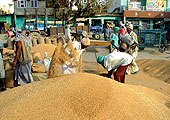 |
| Harvest of plenty: But too
many laws and the stranglehold of mandis are stifling Indian
agriculture |
Land
ownership, seeds, fertilisers, technology, extension services,
marketing, relationships between farmers and traders… there
is nothing about Indian farm sector that is not state monitored
or controlled. Agriculture is India's largest parastatal; in fact,
most politicians are born into it and then live off it for the
rest of their careers. As for bureaucrats, there are armies of
them in every state whose job it is to regulate every aspect of
agriculture.
So, what are we talking about? Unshackling
agriculture? Yes, because while the government spent more than
50 years engineering labyrinthine regulations for the farm sector,
inefficiencies piled up, population kept growing, food insecurity
persisted, technology advanced, and the world at large became
much cleverer. "There is perhaps not a square inch of space
in India that is outside a state-governed APMC (Agricultural Produce
Marketing Committee) mandi for farm commodities. A commodity moving
from Punjab to Kerala would pass through dozens of APMC markets,
attracting 'mandi fee' every time it enters a new regulated market.
In fact, it's easier to import wheat from Australia into Kerala
than from Punjab," says Gokul Patnaik, Chairman, Global AgriSytem,
a Delhi-based farm marketing consultant.
Today, India's 7,000-plus APMC mandis, which
work through a series of commission agents and other middlemen,
have a vice-like grip on trade in every farm commodity imaginable-grains,
pulses, oilseeds, fruits, vegetables, meat, fish, dairy products,
and forest produce. A study conducted by Patnaik in Delhi's vegetable
market estimated that there was 60-75 per cent mark-up in price
of commodities-cornered by middlemen-between the farmer and consumer.
That means the farmer only got 40-25 per cent of the retail price.
The state marketing boards, which manage
the APMC markets, collect mandi fee, and that's a reason why some
of them aren't keen on letting go of the controlled mandis even
after many states amended their APMC laws to allow for private
participation. While Punjab and Haryana governments, for example,
collect hundreds of crores of rupees in mandi taxes, they invest
barely anything in improving infrastructure in these markets.
Most of them are in a pathetic state and characterise a supply
chain that allows large wastage of commodities and their nutritional
values. "The Centre is now guided by the recommendations
of an inter-ministerial task force on agricultural marketing reforms
that called for direct marketing of commodities by farmers to
the consumers outside the mandis (without payment of fees) and
where there is no 'outside', single-point levy of fee," says
a government official, who prefers not to be named.
The task force also recommended contract
farming, private and cooperative sector participation in marketing,
banning of commission agents, and setting up of region-specific
special commodity markets. So, have states moved fast in implementing
and fostering these reforms? Not really. "Except for Andhra
Pradesh and Himachal, most states have yet to frame rules under
their amended APMC laws to implement these reforms. Some of the
states are urging the Centre to come up with a 'model' set of
rules for them to follow," says the government official.
Considering that agriculture is a 'state' subject under the Constitution,
the challenge of reforms becomes even more formidable; each state
must move separately to get its act together.
 |
| India's 7,000-plus APMC mandis
have a vice-like grip on trade in every farm commodity imaginable |
Meanwhile, there are other laws that need
attention. The Essential Commodities Act (ECA), for instance,
continues to impose restrictions on storage and movement of farm
commodities. "There are hundreds of 'control orders' passed
by the states under ECA that will need to be scrapped before free
trading could begin," says Patnaik. A number of states have
been issuing orders under ECA that require a private trader to
obtain a licence if dealing in specified commodities and in quantities
in excess of those prescribed.
Some states have also been dictating maximum
stock of commodities that a trader can hold. And under paddy/rice
levy orders, the licensed traders and millers are required to
give a prescribed percentage of paddy/rice to the states at notified
prices. Control orders have also been issued with regard to display
of stocks and prices, regulation of catering establishments, requisition
of stocks and regulation of distribution of card system.
Himmat Singh, Managing Director, Punjab Agro
Industries Corporation, says though the government has undertaken
several reforms in recent years like the new APMC law, new contract
law, new patent law, and regulated cultivation of genetically
modified crops, the overall impact has not been to dilute the
tight government control over agriculture. "The government
has also failed to apply its mind to determine what kinds of technologies
would be suitable in agriculture-from increasing yields to sorting,
grading, distribution, etc. We don't know the suitability of a
technology with respect to productivity, environment, or labour,"
he says.
Besides, a variety of local laws and levies
in states has made India a confederation of agricultural markets
divided along state boundaries instead of being a single market.
"Despite being composed of several countries, the European
Union is a single agricultural market. India, on the other hand,
is a fragmented market even though it's a close federation of
states," says M.S. Swaminathan, Chairman, National Commission
on Farmers.
India has also taken another 'irrational'
approach of treating all commodities at par-wheat and rice are
given the same status as apples and oranges-instead of exploiting
the commercial potential of more valued crops, points out Singh.
Perhaps, when originally conceived, the various rules and regulations
were meant to help consumers. But today, they are both outdated
and harmful. There's plenty to do in reforming agricultural laws.
A good time to start would be now.
|






